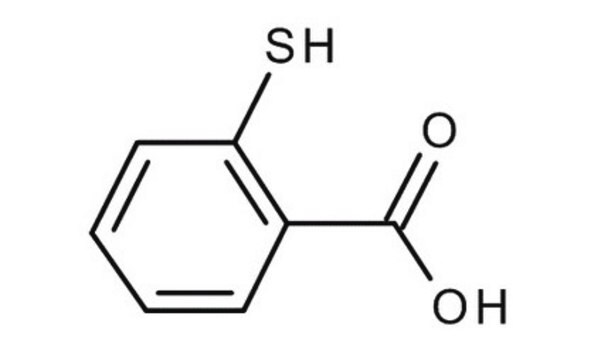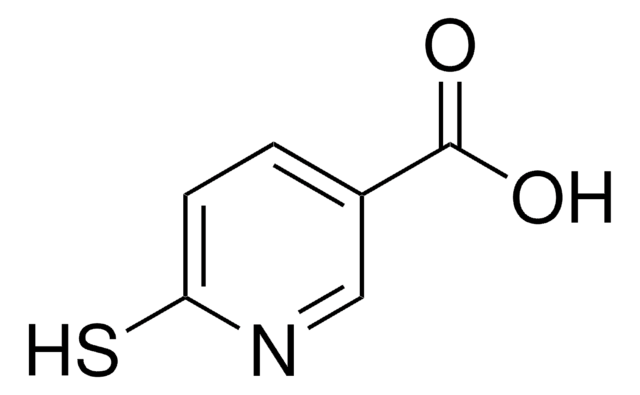662534
4-Mercaptobenzoic acid
technical grade, 90%
Synonym(s):
4-Carboxybenzenethiol, 4-Carboxythiophenol, 4-Mercaptobenzoic acid, p-Carboxybenzenethiol, p-Mercaptobenzoic acid
About This Item
Recommended Products
grade
technical grade
Quality Level
Assay
90%
form
solid
mp
215-224 °C (lit.)
functional group
carboxylic acid
SMILES string
OC(=O)c1ccc(S)cc1
InChI
1S/C7H6O2S/c8-7(9)5-1-3-6(10)4-2-5/h1-4,10H,(H,8,9)
InChI key
LMJXSOYPAOSIPZ-UHFFFAOYSA-N
Looking for similar products? Visit Product Comparison Guide
General description
Application
- SERS substrate for food adulteration detection: 4-Mercaptobenzoic acid was employed in the layer-by-layer biopolymer assembly for the in situ fabrication of AuNP plasmonic paper, serving as a SERS substrate useful in detecting food adulteration (Viriyakitpattana et al., 2024).
- Development of magneto-plasmonic nanoparticles: Research highlighted the use of 4-Mercaptobenzoic acid in the multiwavelength SERS of magneto-plasmonic nanoparticles, obtained through combined laser ablation and solvothermal methods, showing versatility in nanoparticle synthesis (Talaikis et al., 2023).
Signal Word
Warning
Hazard Statements
Precautionary Statements
Hazard Classifications
Eye Irrit. 2 - Skin Irrit. 2 - STOT SE 3
Target Organs
Respiratory system
Storage Class Code
11 - Combustible Solids
WGK
WGK 3
Flash Point(F)
Not applicable
Flash Point(C)
Not applicable
Personal Protective Equipment
Choose from one of the most recent versions:
Already Own This Product?
Find documentation for the products that you have recently purchased in the Document Library.
Customers Also Viewed
Our team of scientists has experience in all areas of research including Life Science, Material Science, Chemical Synthesis, Chromatography, Analytical and many others.
Contact Technical Service















